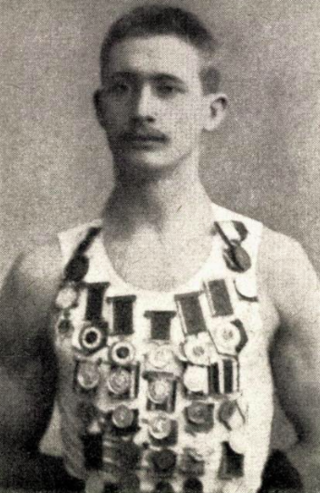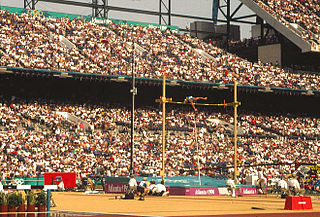
At the 1900 Summer Olympics, twenty-three athletics events were contested. Altogether, 117 athletes from 15 nations competed. A total of 68 medals were awarded. In many countries, due in part to the conflation of the Olympic Games and the World's Fair in Paris, the media discussed only the athletics events under the "Olympic" name while ignoring the incredible variety of other sports featured at the time.

At the 1900 Summer Olympics one gymnastics event for men was contested. The competition was held on Sunday, 29 July 1900, and on Monday, 30 July 1900. There were 135 competitors from 8 nations. The top 18 places were taken by French gymnasts, of which there were more than 100. The event was won by Gustave Sandras, with Noël Bas finishing second and Lucien Démanet third. The highest-placing foreign gymnast was Jules Ducret of Switzerland, in a tie for 19th place.
The men's pole vault competition at the 2004 Summer Olympics in Athens was held at the Olympic Stadium on 25–27 August. Thirty-nine athletes from 25 nations competed. The event was won by Timothy Mack of the United States, the nation's 18th victory in the men's pole vault. Toby Stevenson took silver, making it the second consecutive Games that Americans finished 1st and 2nd. Giuseppe Gibilisco's bronze was Italy's first medal in the event.

The men's 400 metres hurdles was a track & field athletics event at the 1900 Summer Olympics in Paris. This event was held for the first time at the Olympics. The competition took part on July 14 and July 15, 1900. The race was held on a track of 500 metres in circumference. Five athletes from four nations competed in the longest of the three hurdling events. The event was won by Walter Tewksbury of the United States. Henri Tauzin of France earned silver, while George Orton of Canada took bronze.

The men's high jump was a track & field athletics event at the 1900 Summer Olympics in Paris. It was held on July 15, 1900. Eight athletes from seven nations competed in the high jump. The event was won by Irving Baxter of the United States, the nation's second consecutive victory in the men's high jump. Great Britain and Hungary each took medals in their first appearance in the event.

Irving Knott Baxter was an American athlete, who won the gold medal in both the men's high jump and the pole vault at the 1900 Summer Olympics, in Paris, France.

The men's pole vault was one of four jumping events on the Athletics at the 1896 Summer Olympics programme. Five athletes competed in the pole vault. The two Americans far outclassed the three Greeks, starting higher than the Greeks could clear and taking first and second places. Damaskos and Theodoropoulos tied for third, while Xydas took fifth.
The men's pole vault was one of six jumping events on the athletics at the 1908 Summer Olympics programme in London. The competition was held on Friday, July 24, 1908. 15 pole vaulters from seven nations competed. It is the only one of the 111 events featured in 1908 to not have any competitors from the host nation. NOCs could enter up to 12 athletes. The event was won by Edward Cook and Alfred Carlton Gilbert of the United States, the nation's fourth consecutive victory in the men's pole vault. The tie was permitted, rather than a jump-off being held, due to the length of the competition. Similarly, bronze medals were awarded to all three men who had cleared 3.58 metres for third place. Sweden and Canada thus received their first medals in the pole vault, while the United States had the unusual distinction of winning three medals in an event but not sweeping.

Charles Edward Dvorak was an American track and field athlete who specialized in the pole vault. He attended the University of Michigan where he competed for the Michigan Wolverines men's track and field team from 1900 to 1904. He participated in the 1900 Summer Olympics where he was a favorite in the pole vault. However, he missed the competition after being told by officials that the finals would be held on a Sunday. He won a special silver medal in a consolation competition. In 1903, he set a world's record in the pole vault with a jump of 11 feet, 11 inches.(This mark doesn't appear in the progression of World or American Records). Dvorak returned to international competition and won the gold medal in the pole vault at the 1904 Summer Olympics. Dvorak later served as a high school football, basketball and track coach in Seattle, Washington, where he died in 1969 at age 91.

Carl Albert "Flisa" Andersen was a Norwegian pole vaulter, high jumper, and gymnast who competed in the 1900 Summer Olympics, 1906 Intercalated Games and the 1908 Summer Olympics.

Meredith Bright Colket was an American pole vaulter who competed in the 1900 Summer Olympics in Paris and won the silver medal in the men's pole vault ahead of Norwegian Carl-Albert Andersen who won bronze. Irving Baxter won gold.

The men's pole vault was a track and field athletics event held as part of the Athletics at the 1904 Summer Olympics programme. It was the third time the event was held. Seven pole vaulters from two nations participated. The competition was held on Saturday, September 3, 1904. The event was won by Charles Dvorak of the United States, the nation's third consecutive victory in the event. With six of the seven vaulters, the United States swept the top three places—the first time that occurred in the pole vault, though the Americans had never had more than two vaulters compete previously. Through the 1904 Games, no American pole vaulter had ever placed lower than any non-American vaulter.
The men's pole vault at the 1988 Summer Olympics in Seoul, South Korea had an entry list of 21 competitors from 13 nations, with two qualifying groups before the final (15) took place on Wednesday September 28, 1988. The maximum number of athletes per nation had been set at 3 since the 1930 Olympic Congress.

The men's pole vault was an event at the 1996 Summer Olympics in Atlanta, Georgia. Thirty-seven athletes from 24 nations competed. The maximum number of athletes per nation had been set at 3 since the 1930 Olympic Congress. The event was won by Jean Galfione of France, the nation's second victory in the event. Igor Trandenkov took silver, the first medal for Russia in the pole vault in its first appearance as a separate delegation. Similarly, Andrei Tivontchik's bronze was the first for reunified Germany, though both East Germany and West Germany as well as the Unified Team of Germany had previously won medals.
Daniel Slawson Horton was an American track and field athlete who competed at the 1900 Summer Olympics in Paris, France. He was born and died in New York City.

The men's pole vault event was part of the track and field athletics programme at the 1924 Summer Olympics. The competition was held on Wednesday, July 9, 1924, on Thursday, July 10, 1924. Twenty pole vaulters from 13 nations competed. The maximum number of athletes per nation was 4. The event was won by Lee Barnes of the United States, the nation's seventh consecutive victory in the men's pole vault. Americans Glen Graham (silver) and James Brooker (bronze) completed the sweep, the second time the United States had done so—though the Americans had taken two golds and a bronze in 1908 and a gold, two silvers, and a bronze in 1912.

The men's pole vault event at the 1932 Olympic Games took place August 3. Eight athletes from four nations competed. The 1930 Olympic Congress in Berlin had reduced the limit from 4 athletes per NOC to 3 athletes. The event was won by Bill Miller of the United States, the nation's ninth consecutive victory in the men's pole vault. Japan won its first pole vault medal, with Shuhei Nishida's silver. George Jefferson won bronze, extending the American streak of two or more medals in each pole vault to nine as well.

The men's pole vault competition featured in the athletics programme at the 1976 Summer Olympics and was held at the Olympic Stadium in Montréal on 24 and 26 July. Twenty-seven athletes from 13 nations competed. The maximum number of athletes per nation had been set at 3 since the 1930 Olympic Congress.

The pole vault at the Summer Olympics is grouped among the four track and field jumping events held at the multi-sport event. The men's pole vault has been present on the Olympic athletics programme since the first Summer Olympics in 1896. The women's event is one of the latest additions to the programme, first being contested at the 2000 Summer Olympics – along with the addition of the hammer throw, this brought the women's field event programme to parity with the men's.
The men's pole vault competition at the 2016 Summer Olympics in Rio de Janeiro, Brazil. The event was held at the Olympic Stadium between 13–15 August. Thirty-one athletes from 16 nations competed. Thiago Braz of Brazil won the gold medal, the nation's first medal in the men's pole vault. Renaud Lavillenie of France was unable to successfully defend his 2012 gold, but became the seventh man to win two medals with silver this time. Sam Kendricks's bronze returned the United States to the podium after a one-Games absence.















